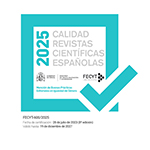Die Erkundung des Morgenlandes zu Beginn der Neuzeit: Sprachknaben – Giovanni di lingua - Enfants de Langues - Jóvenes de lenguas
Resumo
Für alle europäischen Mächte war es zu Beginn der Neuzeit notwendig, über eine Reihe zuverlässiger und loyaler Übersetzer und Sprachmittler (Dolmetscher) für das Osmanische Reich zu verfügen. In diesem Beitrag soll die Ausbildung und Stellung derselben untersucht werden und zwar am Beispiel der Sprachknaben (Giovanni di lingua - Enfants de Langues - Jóvenes de lenguas) an den jeweiligen Botschaften in Konstantinopel. Im 16., 17. und 18. Jahrhundert war es angesichts der unmittelbaren Bedrohung durch die Hohe Pforte für alle Staaten des Abendlandes von entscheidender Bedeutung, möglichst klare Kenntnisse über die Gebiete und Kulturen des Herrschaftsbereichs der Hohen Pforte zu erlangen, obwohl für die spanische Monarchie die Beziehungen zu Konstantinopel eher von zweitrangigem Interesse waren.
Downloads
##submission.format##
Licença
La revista Estudios de Traducción, para fomentar el intercambio global del conocimiento, facilita el acceso sin restricciones a sus contenidos desde el momento de su publicación en la presente edición electrónica, y por eso es una revista de acceso abierto. Los originales publicados en esta revista son propiedad de la Universidad Complutense de Madrid y es obligatorio citar su procedencia en cualquier reproducción total o parcial. Todos los contenidos se distribuyen bajo una licencia de uso y distribución Creative Commons Reconocimiento 4.0 (CC BY 4.0). Esta circunstancia ha de hacerse constar expresamente de esta forma cuando sea necesario. Puede consultar la versión informativa y el texto legal de la licencia.









